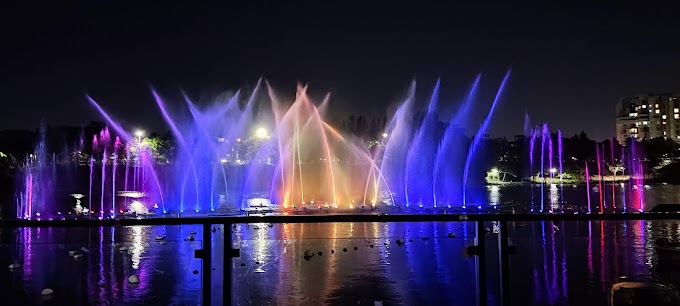Hampi, also referred to as the Group of Monuments at Hampi, is a UNESCO World Heritage Site located in east-central Karnataka, India. It became the centre of the Hindu Vijayanagara Empire capital in the 14th century.
Chronicles left by Persian and European travellers, particularly the
Portuguese, state Hampi was a prosperous, wealthy and grand city near
the Tungabhadra River,
with numerous temples, farms and trading markets. By 1500 CE,
Hampi-Vijayanagara was the world's second-largest medieval-era city
after Beijing, and probably India's richest at that time, attracting traders from Persia and Portugal.
The Vijayanagara Empire was defeated by a coalition of Muslim
sultanates; its capital was conquered, pillaged and destroyed by
sultanate armies in 1565, after which Hampi remained in ruins.

Adiyogi Shiva Statue, Coimbatore, Tamilnadu
July 29, 2021

Harbour
December 26, 2020

Pashan Tekdi
April 02, 2019

Lonavala, Maharashtra
July 29, 2021

Kundala Dam Lake, Munnar, Kerala
July 29, 2021

𝗧𝗨𝗡𝗚𝗡𝗔𝗧𝗛 𝗧𝗘𝗠𝗣𝗟𝗘 𝗨𝘁𝘁𝗮𝗿𝗮𝗸𝗵𝗮𝗻𝗱 🕉 🔱
August 07, 2021

Sri Kedarnath Temple, Uttarakhand 🙏🔱🕉️
August 06, 2021

Harihareshwar View Point || Sunset - Dec 2022
December 17, 2022

Velas Turtle Festival 2023
April 15, 2023
Featured Post

June 09, 2024
Ghangad Fort घनगड फोर्ट
Popular Posts
New York
July 31, 2023

कूम्भलगढ राजस्मद राजस्थान
August 20, 2021

Harbour
December 26, 2020

Pashan Tekdi
April 02, 2019

𝗧𝗨𝗡𝗚𝗡𝗔𝗧𝗛 𝗧𝗘𝗠𝗣𝗟𝗘 𝗨𝘁𝘁𝗮𝗿𝗮𝗸𝗵𝗮𝗻𝗱 🕉 🔱
August 07, 2021

Ghangad Fort घनगड फोर्ट
June 09, 2024

Sun & Snow
July 31, 2023
Red Panda
July 31, 2023

Jivdhan Fort
June 08, 2024
Photography Checklist
- Digital Photography Complete Course
- Canon EOS Rebel T7 DSLR Camera
- Pro Lens Kit for iPhone and Android
- Phone Tripod & Selfie Stick
- SanDisk 128GB Extreme Memory Card
- SanDisk 128GB Ultra micro
- LP-E10 Batteries for Canon EOS
- Portable Photography Lighting
- Remote Control Wireless Shutter for Canon EOS
- Professional Lens Filter
- Backdrop Background for Photography
Categories
Tags

कूम्भलगढ राजस्मद राजस्थान
August 20, 2021

Harbour
December 26, 2020
New York
July 31, 2023

Virginia Aquamarine Center
December 26, 2020

Dhanushkodi, Tamilnadu The Last Road of India
July 30, 2021

Pashan Tekdi
April 02, 2019

𝗧𝗨𝗡𝗚𝗡𝗔𝗧𝗛 𝗧𝗘𝗠𝗣𝗟𝗘 𝗨𝘁𝘁𝗮𝗿𝗮𝗸𝗵𝗮𝗻𝗱 🕉 🔱
August 07, 2021

Ghangad Fort घनगड फोर्ट
June 09, 2024

Lonavala, Maharashtra
July 29, 2021
Footer Menu Widget
Created By SoraTemplates | Distributed By Blogger Themes

